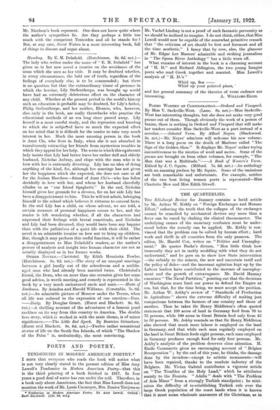Humbug. By E. M. Delafield. (Hutchinson. 8s. 6d. net.)— The
lady who writes under the name of " E. M. Delafield " has given us in her new novel a treatise on the avoidance of the noun which she uses as her title. It may be doubted whether, in every circumstance, the bald use of truth, regardless of the feelings of everybody else, is to be commended ; but there is no question but that the extraordinary tissue of pretence in which the heroine, Lily Stellenthorpe, was brought up would have had an extremely deleterious effect on the character of any child. Whether at the present period in the world's history such an education is probable may be doubted, for Lily's father, Philip Stellenthorpe, and her mother, Eleanor, who, however, dies early in the book, are really throwbacks who practise the educational methods of an era long since passed away. Lily herself is a most careful study, and the repression and humbug to which she is subjected have so much the expected effect on her mind that it is difficult for the reader to take very much interest in her. Much the most amusing person in the book is Aunt Clo, who lives in Italy, when she is not absorbed in tumultuously extracting her friends from mysterious troubles in which they appeal for her help. The scene in which this efuberant lady insists that Lily had better leave her rather dull and elderly husband, Nicholas Aubray, and elope with the man who is in love with her is extremely diverting. Lily has no idea of doing anything of the kind, for, although her marriage has not given her the happiness which she expected, she does not care at all for the Italian Marchese—friend of Aunt Clo's—who has fallen decidedly in love with her, and whom her husband cheerfully alludes to as our friend Spaghetti." In the end, Nicholas himself gives her grounds for a divorce, for on her side Lily has been a disappointment to him. This he will not admit, belonging himself to the school which believes it virtuous to conceal facts. In the end Lily has a child, on whose advent, we are told, a certain measure of personal happiness comes to her, and the reader is left wondering whether, if all the characters had expressed their feelings with brutal exactitude, and Nicholas and Lily had been divorced, they would have been any happier than with the palliatives of a quiet life with their child. The novel is an admirable treatise on how not to bring up children. But, though it may perform this useful function, it will be rather a disappointment to Miss Delafield's readers, as the author's powers of analysis and insight into human character are not as notably displayed as in her former works.


































 Previous page
Previous page